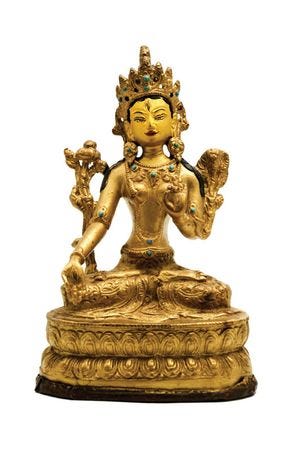A Mother's Love on Moon Day
It strikes me as peculiar that we celebrate Mother’s Day on a Sun Day, sun symbolism being the often patrial Sky Gods that it often is.
Still, I see the purpose, industrial capitalists that we are. We planted this Holy Day on a “weekend” in accordance with what few rights we won during the labor battles of the 30s.
So Be It. In the meanwhile, I excerpt (sans permission) the following text pertaining to the Second Turning of the Wheel of the Dharma:
About five centuries after the Buddha, the Wheel of the Dharma, they say, turned again. The Buddha’s central teaching of interdependent co-arising was confirmed and clothed in fresh language and images. This second turning of the wheel rings out in scriptures called Perfection of Wisdom, Prajnaparamita, which herald the advent of Mahayana1 Buddhism.
Here the hero figure of the bodhisattva appears, no longer solely identified with former lives of the Buddha, but with everyone who experiences the interdependent nature of reality. Here that wonderous insight is personified. Emerging in the same era as did her Mediterranean counterpart, Sophia2, this embodiment of wisdom is female. She is the Perfection of Wisdom, the Mother of All Buddhas.
— World as Lover, World as Self by Joanna Macy3

There’s a whole passage in this text which then addresses an advancement of the theory of numbers made in India during this time, which relates to the Buddhist concept of “No Thingness.” I can easily relate this to the more advanced Western ideas of God, but there’s no time here.
Instead, what I would like to do is point out that Buddhism had a second turning of the wheel. Christianity can claim that it had Protestantism but, to this day, Patriarchy reigns in some of these abodes. (Ask a fundamentalist what he thinks the book of Timothy says about whether women should be leaders in the Church, or whether homosexuality is a sin.)
This is Not to Say
that somehow Buddhism is void of misogyny, nor that the advent of Tara in the iconography is any different than the advent of the Theotokos (Vessel, or “Mother” of God) in (Orthodox) Catholic Christianity.
Joanna Macy may have an opinion different than my own.
Nevertheless, I think it’s important to tease out what equality we can from some of these Ancient sources, if for no other reason than to create a sense of Good Will, Charity, and (more importantly) Participation in a sensibility which transcends the limitations of our own.
What better Opportunity could greet us?
“Greater Vehicle” (Maha - Yana) Compare to the Yamas of Yoga.
Philosophy: Philo - Sophia, “Familial Love of Wisdom” as in Brotherly Love to a Sister
Macy, Joanna. World as Lover, World as Self. Parallax Press, Berkeley. 1991.




